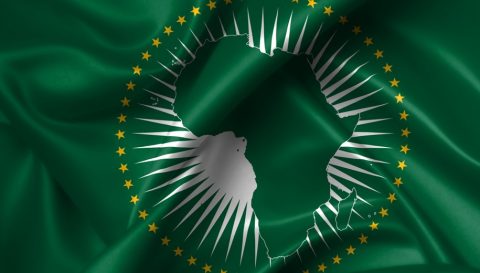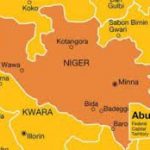[OPINION] Africa’s Infrastructure Deficit: The Hypocrisy Of The Heritage Foundation’s Alarm
Articles/Opinion, Featured, Featured Contributors/Columnists, Latest Headlines, News, News Across Nigeria, News From The State Monday, October 12th, 2020
By Abubakar John
(AFRICAN EXAMINER) – For those who have been following the turn of events in the trade war between the United States (U.S.) and China in recent time, Shakespeare’s popular quotes, “Hell hath no fury like a woman scorned” becomes a truism. With the U.S. being the metaphoric husband, China as the new lover and Africa the beautiful bride, it is becoming clearer that U.S. is all out to rubbish China and make her less attractive to its jilting erstwhile bride. Already, the U.S. has deplored its international communication soft power mechanisms.
One of such is the recent report by Heritage Foundation, a Washington-based Think-tank which hypocritically portray Beijing’s infrastructure interventions in roads, buildings, railways construction as insidious and undesirable. There can be no better words to describe the anti-China views expressed in the publication than hypocrisy. Joshua Merservey, in the said article titled “Government Buildings in Africa Are a Likely Vector for Chinese Spying” detailed what he described as the threat to US interest in Africa against the backdrop of the rising Chinese influence in the continent.
The key takeaways in the report are that: “Beijing ‘likely has better surveillance access’ to Africa than anywhere else by having built or renovated at least 186 African government buildings; Beijing ‘likely’ uses surveillance to, among other things, advantage its companies competing for contracs, spy on U.S. officials, and influence African officials, and that ” the U.S. should try to complicate Beijing’s surveillance of an important continent as part of a strategic response to the CCP’s effort to reshape the global order.”
According to the author, “the Chinese Communists Party’s (CCP’s) two-decade-long blitz of engagement in Africa has ‘likely’ given it extensive surveillance access to the continent.” He went further to enumerate four primary dangers it poses for U.S.
On its face value, one is tempted to think that the author is genuinely concern about the plights of Africa as victim of an ungodly powerplay between the two, especially given the Western economic predators had for long plundered the black continent mercilessly to satisfy its own greed. A cursory insight into the report, however, reveals something different. First, it instead portrays Africa further as a pawn in the power game, with the continent at the centre of a deadly rape and the consequent clash of interest of the leading world economies.
The Heritage Foundation report, at its best, offers a glaring prism into the mind of Washington vis-à-vis the renewed scramble for the control of the economic resources in the continent of Africa and but travestly presented the U.S. as one with the legitimate ‘right’ to the spoils of crime it seeks to condemn. Perhaps, this is another timely warning for governments in Africa on the need for greater vigilance.
* Africa’s Infrastructure Deficits
Since the past decades and despite its aged-long engagement with the West, Africa countries continue to experience stiffening growth owing to a number of factors. Africa’s much needed Infrastructure that could enable a leap-frog into growth and development remains a mirage. The African Development Bank, AfDB’s African Economic Outlook in 2018 estimated the annual infrastructure deficit in Africa as $108 billion.
Expectedly, the 54 countries that make up the continent are all yearning for solutions to the quagmire. Infrastructure deficit, hard and soft, has been undermining all the efforts towards achieving sustainable development and structural transformation in Africa, particularly in view of a rapidly growing population. Indeed, the emergence of a large middle class estimated at nearly 350 million in 2010, is driving the demand for socio-economic infrastructure including access to, power, water and sanitation. There is a general consensus that with committed leadership, political will and private sector actively involved in infrastructure development, this gap can be closed.
According to AfDB projection, Power demand in Africa will rise from 125 gigawatts (GW) required in 2010 to 700 GW by 2040; Transportation volumes on the continent will increase by up to 6-8 times and even higher for landlocked countries; Port throughput is projected to rise from 265 million tonnes in 2009 to 2 billion tonnes in 2040; Water pressure will increase, endangering Nile, Niger, Orange and Volta basins; and Demand for ICT will multiply by 20 by 2020. The challenges are daunting. These among others are compelling reasons why governments in the continent are going offshore for partnership and business deals that could help bridge the infrastructure gap in their various countries.
This is particularly so because the options of funding from Internally Generated Revenue (IGR) that is opened to these countries have proven to be grossly inadequate, especially given the fact that the provision of infrastructure by government is considered the first step to jump starting domestic economy from where those taxes and levies could be generated. In its long years of engagement with the continent, the West, has failed to offer the needed assistance. In Nigeria for instance, the oil multinational represented by America’s ExxonMobil, Royal Dutch Shell, Italian’s Agip, France’s Total, Chevron and other big players in the industry have been prospecting crude oil and shipping raw to their countries and prefer to ship refined products by to Africa rather than built refineries.
China’s Intervention
The Journal of Modern Africa Studies published by Cambridge University Press vol. 44 issue3 captures Beijing’s thus: China’s vastly increased involvement in Africa over the past decade is one of the most significant recent developments in the region. It appears to contradict the idea of international marginalisation of Africa and brings significant economic and political consequences.
China’s Africa interest is part of a recently more active international strategy based on multipolarity and non-intervention. Increased aid, debt cancellation, and a boom in Chinese-African trade, with a strategic Chinese focus on oil, have proven mutually advantageous for China and African state elites. By offering aid without preconditions, China has presented an attractive alternative to conditional Western aid, and gained valuable diplomatic support to defend its international interests.
And that is why Beijing’s increasing engagement in the continent has continued to unsettle the West, who until past few decades had enjoyed the fortune of near unrivalled economic monopoly.
The Heritage Foundation, in its report noted a 2017 report which branded China ” the world’s principal IP infringer,” while a recent U.S. Trade Representative investigation found that the U.S. loses at least $50 billion every year to unscrupulous Chinese activity.
Earlier in the year, the U.S. reiterated as part of its accusations of unfair business deals against Beijing in which Huawei, Tik Tok were pointedly accused by the Trump administration of data mining and spying on the US. This is just one of the many other issues between Washington and Beijing. The position of Beijing, however, is that the allegations are largely unproven.
But whereas, Africa remains a beautiful bride in their quest for business exploration’, Africa ought to be left alone to determine the partnership that tickle its fancy. And that is why the Heritage report is viewed in some quarters as a propaganda move to diminish China’s influence rather than an altruistic effort that helps the course of Africa.
Quoting a January 2018 edition of the French newspaper- Le Monde, the report alleged that “servers installed by the Chinese telecommunications giant, Huawei in the African Union (AU) headquarters were daily uploading their content to servers based in Shanghai, China.
An inspection of the building-built by the state-owned China State Construction Engineering Corporation -also uncovered listening devices hidden throughout the building. Three days later, the financial Times newspaper confirmed Le Monde’s story,” the report further claimed. It however concluded without evidence that “Beijing’s eavesdropping on African government buildings likely extends well beyond AU headquarters”.
While these allegations constitute serious infringement if proven, some have likened the U.S. position that of a kettle calling pot black, having itself been known as chief intelligence gatherer globally.
John is a journalist and public commentator. He writes from Abuja.
Related Posts
Short URL: https://www.africanexaminer.com/?p=56692





















